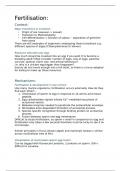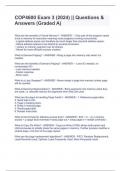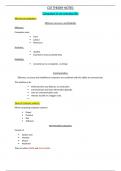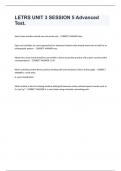Date: 26.01.22 @ 9:00-11:00
Are people still smarter than machines?
Natural Cognitive Tasks: in vision, computational approaches have made substantial gains and
machines can match human performance after training. Although tailored to task, still impressive
Limitation → narrowness of the focus in systems that have some degree of AI, there are things that
it does not take into account that humans would (information can play a role in inferences/plans)
The human brain contains 1011 neurons and 1015 synapses, and that synapses carry out floating
point operations (e.g., multiplying an incoming activation signal times the connection weight) at a
temporal resolution approaching about 1000 Hz → that comes to 1018 multiplies per second
What other kinds of progress will be necessary?
1. Computational Theory → lots to understand about the relationship between stimulus variables and
underlying reality: difficult to know how to frame a computational problem, for example, learning
about the relationship between situations and consequences, 2 views:
1. Construe the learner’s goal as one of extracting a statistical model of environment
2. Define the goal in terms of the problem of optimal prediction, allowing the internal model
to remain inchoate instead of explicit
2. Algorithm & Representation → how a computational mechanism can actually exploit information
effectively, which algorithms and representations? Exploring the computational basis of the
characteristics of brain representations
3. Architecture → question of ‘the cognitive architecture’: used in modeling human cognition and
building artificial cognitive systems. A common theme is to stress some sort of hybrid combination
of explicit symbolic and implicit, connectionist, sub-symbolic components
4. Nurturance, Culture & Education → an additional step that is needed is understanding the roles of
nurturance, culture and education in structuring human cognition and understand how it develops
The Imitation Game = played with three people: a man (A), a woman (B) and an interrogator (C)
who may be of either sex. The interrogator stays in a room apart from the other two. The object of
the game for the interrogator is to determine which of the other two is the man and which is the
woman. The interrogator is allowed to ask questions to A and B
,In order that tones of voice may not help the interrogator the answers should be written
It is A’s object in the game to try and cause C to make the wrong identification
The object of the game for the third player (B) is to help the interrogator
Big question → what will happen when a machine takes the part of A in this game?
The new problem has the advantage of drawing a fairly sharp line between the physical and the
intellectual capacities of a man → interrogator cannot demand practical demonstrations
● The game may perhaps be criticised on the ground that the odds are weighted too heavily
against the machine. If the man were to try and pretend to be the machine he would clearly
make a very poor showing: given away at once by slowness and inaccuracy in arithmetic
The short answer: we are not asking whether all digital computers would do well nor whether the
ones present available would do well, but if there are imaginable computers which would do well
Digital Computers = intended to carry out any operations which could be done by a human
computer. It can usually be regarded as consisting of three parts:
1. Store → stores information: corresponds to the human computer’s paper/memory
2. Executive Unit: carries out the various individual operations involved in calculations
3. Control → detect that instructions given are obeyed correctly & in the right order
If you want to make a machine mimic the behaviour of the human computer in some complex
operation, you ask him how it is done, and then translate the answer into the form of programming
Charles Babbage → planned a digital computer machine, called the Analytical Engine, but it was never
completed. Although he had all the ideas, his machine was not at that time such a attractive prospect
Discrete State Machines = (like digital computers) the machines which move by sudden jumps or
clicks from one quite definite state to another. Provided it could be carried out quickly, the digital
computer could mimic the behaviour of any discrete-state machine. Must have adequate storage
capacity and be sufficiently fast, must be programmed afresh for each new machine it should mimic
Can machines think? → many objections
Theological Objection = “thinking is a function of a man’s immortal soul, no animal or machine
can think” → would be less likely He would consider the circumstances suitable for conferring a soul
, ‘Heads in the Sand’ Objection = “the consequences of machines thinking would be dreadful and
let’s hope they cannot do so” → we like to believe that humans are in some way superior
Mathematical Objection = Godel’s Theorem: “in any sufficiently powerful logical system,
statements can be formulated which can neither be proved nor disproved within the system, unless
possibly the system itself is inconsistent” → although it is established that there are limitations to the
powers of any machine, it has been stated without any proof that these apply to human intellect
Argument from Consciousness = “machines should have consciousness to equal a real human
brain” → appears to deny the validity of the test: assumes the only way by which we can be sure that
a machine thinks is to be the machine and feel oneself thinking. Test: viva voce (game without B)
Arguments from Various Disabilities = “you will never be able to make a machine do X” →
mostly founded on the principle of scientific induction, claim that “machines cannot make
mistakes”, but a machine would not attempt to give the right answers to the problems. Also claim
that “a machine cannot be the subject of its own thought”, but by observing the results of its own
behaviour it can modify its own programs as to achieve some purpose more effectively
Lady Lovelace’s Objection = “the analytical engine has no pretensions to originate anything, it can
do whatever we know how to order it to perform” → a variant states that a machine can “never take
us by surprise”, mostly as we don’t do enough calculation to decide what to expect them to do
Argument from Continuity in Nervous System = “one cannot expect to be able to mimic the
behaviour of the nervous system with a discrete-state system” → within the game, the interrogator
will not be able to take any advantage of this difference
Argument from Informality of Behaviour = “it is not possible to produce a set of rules
purporting to describe what a man should do in every conceivable set of circumstances” → if each
man had a definite set of rules of conduct by which he regulated his life, he would do no better than
a machine. But there are no such rules, so men cannot be machines
Argument from Extrasensory Perception = in the game, the man might win because of
telepathy/clairvoyance, or the machine with a random number generator is influenced by the
psychokinetic powers of the interrogator → anything can happen











